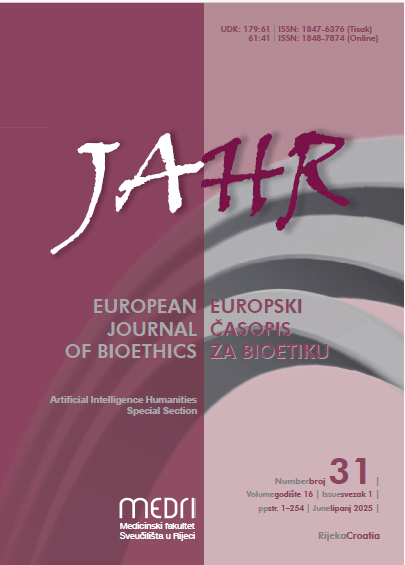Bioetika na portugalskom tlu
kratki uvod s ograničenim uvidom
Keywords:
Bioetika, Mediteran, Portugal, povijest bioetikeAbstract
https://doi.org/10.21860/j.16.1.2
Bioetika je u Portugal stigla sa stanovitim „zakašnjenjem”: prvi je centar osnovan 1988. u Coimbri (Centro de Estudos de Bioética), potom prva katedra 1996. pri Medicinskom fakultetu Sveučilišta u Portu (Serviço de Bioética e Ética Médica), a 1998. osnovan je i Centar za bioetiku Medicinskog fakulteta Sveučilišta u Lisabonu (Centro de Bioética da Faculdade de Medicina da Universidade de Lisboa). Kao i Portugalsko društvo za bioetiku, koje je osnovano 2003., ove se ustanove bave isključivo biomedicinskom etikom. Nešto širu vizuru bioetike, izvan one angloameričke sužene na medicinsku praksu i biomedicinska istraživanja, gaji samo Institut za bioetiku Portugalskoga katoličkog sveučilišta.
Pionirima portugalske bioetike i suosnivačima prvih institucija bili su patolog Daniel dos Santos Pinto Serrão (1928. – 2017.), farmakolog Walter Friedrich Alfred Osswald (r. 1928.), isusovac-molekularni genetičar Luís Jorge Peixoto Archer (1926. – 2011.), isusovac-filozof Roque Cabral (1927.-2021.), pedijatar Jorge Biscaia (1928. – 2014.), kao i filozofski par Renaud – Isabel Carmelo Rosa (r. 1942.) i Michel (r. 1941.).
Temeljem pregleda literature, osobnih kontakata i rezultata terenskog istraživanja ovaj rad nudi kratak pregled nastanka i razvoja bioetike na portugalskom tlu: počev od institucionalnog doprinosa pa sve do prinosa pojedinaca.
Downloads
Published
Issue
Section
License
Authors who publish with this journal agree to the following terms:
- Authors retain copyright and grant the journal right of first publication with the work simultaneously licensed under a Creative Commons Attribution License that allows others to share the work with an acknowledgement of the work's authorship and initial publication in this journal.
- Authors are able to enter into separate, additional contractual arrangements for the non-exclusive distribution of the journal's published version of the work (e.g., post it to an institutional repository or publish it in a book), with an acknowledgement of its initial publication in this journal.
- Authors are permitted and encouraged to post their work online (e.g., in institutional repositories or on their website) prior to and during the submission process, as it can lead to productive exchanges, as well as earlier and greater citation of published work (See The Effect of Open Access).



